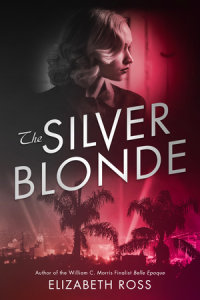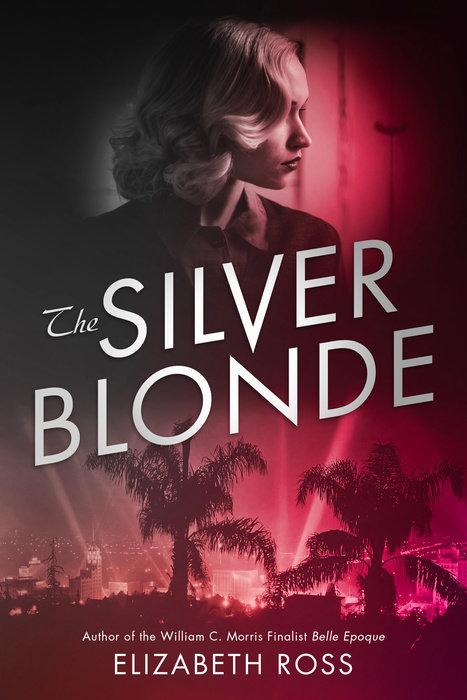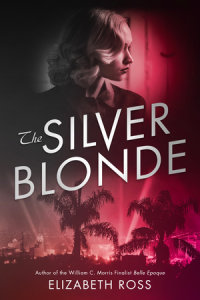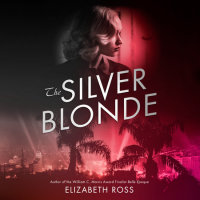The Silver Blonde
For fans of Ruta Septys and Monica Hesse comes a lush historical mystery set in post-World War II America against the flashy backdrop of Hollywood's film studios about a shocking murder that threatens to unearth the ghosts of a young German immigrant's past.
Hollywood, 1946. The war is over, and eighteen-year-old Clara Berg spends her days shelving reels as a vault girl at Silver Pacific Studios, with all her dreams pinned on getting a break in film editing. That and a real date with handsome yet unpredictable screenwriter Gil. But when she returns a reel of film to storage one night, Clara stumbles across the lifeless body of a woman in Vault 5. The costume, the makeup, the ash-blond hair are unmistakable--it has to be Babe Bannon, A-list star. And it looks like murder.
Suddenly Clara's world is in free-fall, her future in movies upended--not to mention that her refugee parents are planning to return to Germany and don't want her to set foot on the studio lot again. As the Silver Blonde murder ignites Tinseltown, rumors and accusations swirl. The studio wants a quick solve, but the facts of the case keep shifting. Nothing is what it seems—not even the victim.
Clara finds herself drawn, inevitably, to the murder investigation, and the dark side of Hollywood. But how far is she willing to go to find the truth?
An Excerpt fromThe Silver Blonde
Chapter One
Girl Friday
Clara raced upstairs as though pursued, taking the steps two at a time, grabbing the handrail without needing to look, one final leap to the landing--she could have been flying.
The corridor was lined with cutting rooms on either side. She could hear the whir and babble of competing film soundtracks--glorious--like an orchestra tuning up. Her heart hammered in her throat as she reached Sam’s door. Right before knocking, she caught herself--there’s nothing more exquisite than wanting something when you’re so close to getting it.
The editor was not alone in his cutting room. The head of postproduction, Mr. Thaler, and the screenwriter, Mr. Brackett, flanked him; dialogue crackled from the speaker. Clara paused in the doorway, ready to back out.
Sam turned. “Clara, come in. With you in a moment.”
Clara perched on a stool by the film bench, folding her long limbs over one another. She heard Gil’s teasing in her head: Tall and not worried about it. Clara pressed her lips together to keep from smiling. He had told her she was a shoo-in, he had told her she’d nothing to worry about. She straightened, rolled her shoulders back, head up--confident, or feigning it at least. Had she made enough of an effort? She’d chosen her smartest skirt and decent shoes, the peach suede pumps. She should have worn lipstick, but makeup made her feel like a clown, and jewelry was discouraged. It could get caught on the film equipment--she’d read that in the postproduction manual.
The men parted slightly, and Clara peered past Sam’s shoulder to the Moviola, a metal contraption for viewing film footage, like an industrial sewing machine operated with a foot treadle. There was a close-up of Barbara Bannon frozen on the small screen. Glamorous Miss Bannon was the star of Letter from Argentan--famous for her side-sweep of ash-blond hair and husky voice.
“If I’m going to sell it, we need more pieces, some close-ups,” said Sam. “Her hands pushing him off, her feet scrambling, she reaches for the letter opener--that kind of thing. Right now the struggle is too quick. We need to draw out the suspense.”
Clara’s ears pricked up. Nothing studio people said when it came to filmmaking was irrelevant to her. She hoarded information like this.
“I hear she’s difficult,” said Thaler. “Hates her co-star. Gives Howard a hard time too. Changing lines, storming off set.”
Mr. Brackett smoothed his mustache. “She wants the widow character to be stronger. Less of a limp noodle.” Impeccably dressed, he brushed a fleck off his dark navy suit. “I believe that is the expression she used.”
Thaler shook his head. “She’s playing a war widow, not a femme fatale. It’s not Gilda.”
Clara had read about these rumors in Hedda Hopper’s gossip column.
Director Howard Hawks and leading lady Barbara Bannon reunite for Letter from Argentan, Bannon’s first role since the death of her husband and costar, Gregory Quinn. Hawks is also producing the picture for Silver Pacific, with principal photography under way. Sources tell me that the production is off to a bumpy start, with thesps clashing on set. Rumor has it that Bannon’s new costar, erstwhile matinee idol Randall Ford, resents being cast as the villain in the suspense drama. The stakes are high all around. In this test of her star power, will audiences respond to Babe Bannon without her leading man (and box-office draw), Gregory Quinn, by her side?
Sam sighed. “I’ll talk to Howard about the inserts. The studio won’t be happy; we’re already behind.”
Clara cleared her throat. “Couldn’t you use the stand-in?” The men turned. Mr. Thaler blinked at her as if the furniture had started talking. A flush spread up her neck. “I mean for the close-ups of her hands and feet,” she said.
“This is Clara Berg from the film archive,” said Sam apologetically, pushing up his shirtsleeves. “I think I mentioned her.”
“Ah,” Mr. Thaler barked. “So she’s the one.” He stood astride, feet planted, hands on his hips, like a sheriff in a Western. “Sam tells me you applied for the apprentice editor position?”
Clara stood up; this was her moment. “That’s right.” She raised her chin and maintained eye contact even though her legs felt like jelly.
“Quite the career move for a young lady--a union position with the promise of promotion.” His voice boomed unnecessarily. She was only a few feet from him.
“That’s the plan, sir,” said Clara. Her breath was shallow, and her pulse ticked up. Please say yes, please say yes, she silently implored.
“And our boys back from the war”--Thaler frowned, a pause of disapproval--“with families to support.”
“Thaler, it’s 1946,” said Mr. Brackett. “War’s been over for a year.” He winked at Clara.
Mr. Thaler ignored him. “How old are you?” he asked. His eyes ran over her, and she folded her arms, wishing she were wearing a cardigan over her thin blouse. Miss Simkin, the film librarian, had warned Clara about Thaler--he didn’t promote women.
“Eighteen. Nineteen in the fall,” she added.
“And once we’ve trained you up, who’s to say you won’t take off and get married--that’s my concern.”
A jungle cat began to pace inside Clara. She took a step toward him. In her pumps they were the same height. “I’m not getting married anytime soon, Mr. Thaler,” she said firmly. “I’ll be too busy working my tail off in the cutting room.”
Mr. Brackett chuckled and slapped Mr. Thaler on the back. “Never heard of the modern woman?” He nodded his head toward Clara, and his oiled hair gleamed under the light. “We’ve got a ‘Girl Friday’ on our hands.”
She bit down on a smirk, grateful to the screenwriter for taking her side. She wondered if it was because she was friends with Gil. He and Brackett were partners, after all.
“Clara is well versed in postproduction,” said Sam, chiming in. “She has a sharp eye and is quick to learn. Already helped us out on the bigger days when we were drowning in footage.” He nodded a smile, reassuring her. “She’s very keen.” His eyes darted back to his boss, and he pushed his glasses up, a nervous tick she’d noticed before.
“Go on, Thaler. Give the gal a chance.” Roger Brackett was enjoying this.
Mr. Thaler shrugged. “Well, Sam,” he said reluctantly. “If you’re happy with it.” He relaxed his cowboy stance. “Okay, Miss Berg.” He smiled like the Big Bad Wolf pretending to be Grandma. “We’ll give you a shot.”
Clara beamed. “I won’t let you down.” She knew there would be no second chances.
Clara floated downstairs to the film archive a new person--older, more sophisticated. It was the same way she felt on her birthday, like something had invisibly changed, as though she’d been reinvented. Apprentice editor.
“Well done, Clara.” Lloyd, the other vault runner, pumped her hand, his mop of strawberry-blond hair grazing his eyelashes in a way that made Clara blink and sweep her own hair away from her face.
“Thanks,” she said. His surprise at her promotion made her feel a tinge of regret--she hadn’t told him she was applying for the job. And truthfully Lloyd was no competition. He had little interest in film editing; his sights were set on casting or publicity. He reminded her of a golden retriever, too exuberant, sometimes annoying but generally harmless.
Not even Miss Simkin could dampen her mood. “Congratulations, Clara,” she said, rearranging her mouth to form a tight smile. “I suppose we’ll need to make the most of you while we still have you--there’s no shortage of work to be done.” Her eyes traveled to Clara’s feet, and she noticed the peach pumps. “What are you wearing?” said Miss Simkin. “Appropriate footwear, please.” She marched back to her office, her bobbed hair as rigid as a helmet.
From under her desk Clara retrieved the regulation saddle shoes and contemplated the ugly lace-up flats. With a glance at Simkin’s office, she tossed the work shoes back out of sight. Today she would flaunt the rules.
For the rest of the day the colors of Silver Pacific studios were sharper and brighter, and everyone she passed was smiling. Clara could have leapt into song like in an MGM musical. It was Thursday, which meant just one more day under Simkin, one more day running reels of film back and forth from the cutting rooms to the vaults. And by Monday everything would be different. The world had given her what she wanted, as smooth as oiled gears sliding her future into place.
Well, almost everything.
Clara chewed her lip and glanced at the clock. It was nine p.m., and she was alone in the film archive waiting for Gil to call. To kill time she had a stack of Argentan dailies to watch. She had helped herself to the Moviola in Miss Simkin’s office--it was used to check prints for flaws or to identify unlabeled reels. Clara’s plan was to be familiar with as much footage as possible before Monday. Apprentice editor. She rolled the syllables over her tongue. It was still a thrill.
It was getting late for after-work drinks. But she wasn’t about to let her triumphant day fizzle like this. She would give him another twenty minutes. How long could it take to fix a few script pages, anyway? All that white space, it was hardly any words at all.
The first time she’d met Gil, a rainstorm had drenched the Southland. The lot was deserted; everyone else at the studio was indoors staying dry. Clara had taken shelter under the awning of the Writers’ Block (pun intended), not minding that her shoes and the edge of her skirt were getting wet. As the rain hammered the asphalt, she craned her neck and tilted her cheek to feel the raindrops, unaware that she wasn’t alone.
“Watching the show?” When he spoke, she spun around like a skittish horse, and he apologized.
She laughed at herself, then nodded to the rain. “I like the change. A reprieve from endless sun.”
“I like it too,” he said, and stood next to her at the edge of the awning, hands in pockets. “Makes the city more honest somehow.” A gust of wind took down a husk from a palm tree. He pulled up the collar on his suit jacket. A side glance, and Clara caught a flash of his dark hair, his jawline.
Normally she would have resented small talk with a stranger at a moment like this. But she could tell he was sharp, and she liked his wry turn of phrase. They stood there together for a while, just--as Gil said--watching the show.



